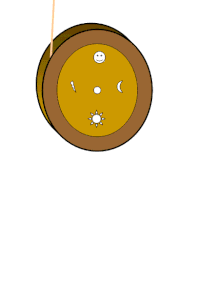Yoyo
 |
|
| Availability | 500 BC–present |
|---|---|
A yo-yo (also spelled yoyo) is a toy which in its simplest form is an object consisting of an axle connected to two disks, and a length of string looped around the axle, similar to a slender . It is played by holding the free end of the string known as the handle (usually by inserting one finger into a slip knot) allowing gravity or the force of a throw to spin the yo-yo and unwind the string (similar to how a pullstring works), then allowing the yo-yo to wind itself back to one's hand, exploiting its spin (and the associated rotational energy). This is often called "yo-yoing". First made popular in the 1920s, yo-yoing remains a popular pastime of many generations and cultures. It was known in ancient Greece, but it is often associated with Japanese culture, because it is very popular in Japan. The World Yo-Yo Contest has historically been dominated by the Japanese-taking home 71 World Titles in the past 22 years. Shinji Saito remains the most decorated yo-yoer of all-time with 13 World Titles. Takeshi Matsuura is second with 6.
In the simplest play, the string is intended to be wound on the spool by hand; The yo-yo is thrown downwards, hits the end of the string, then winds up the string toward the hand, and finally the yo-yo is grabbed, ready to be thrown again. One of the most basic tricks is called the sleeper, where the yo-yo spins at the end of the string for a noticeable amount of time before returning to the hand.
Many yo-yo tricks are done while the yo-yo is said to be sleeping. One of the most famous tricks on the yo-yo is "walk the dog". This is done by throwing a strong sleeper and allowing the yo-yo to roll across the floor, before tugging it back to the hand. English historical names for the yo-yo include bandalore (from French) and quiz. French historical terms include bandalore, incroyable, de Coblenz, emigrette, and joujou de Normandie (joujou meaning little toy).
Webster’s Collegiate Dictionary states that the word "yo-yo" likely derives from the northern Philippine Ilokano language word "yóyo".
...
Wikipedia
